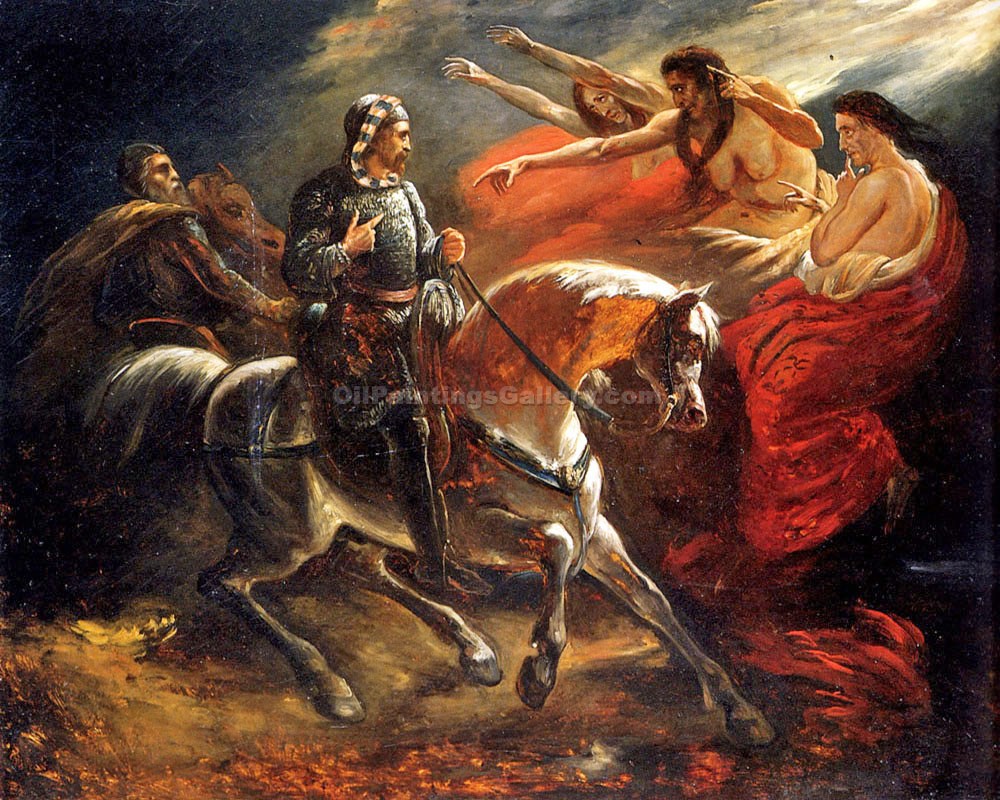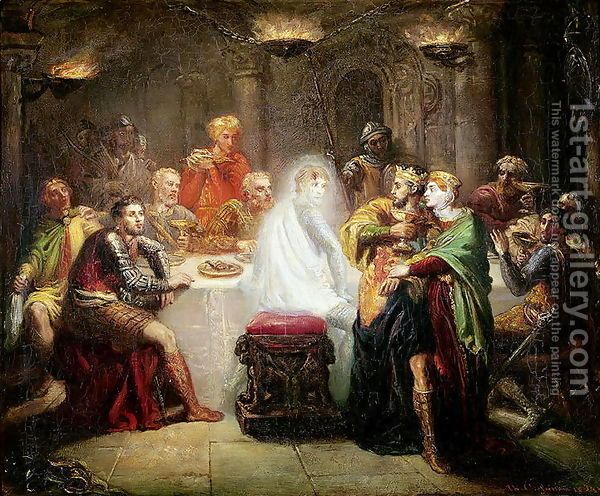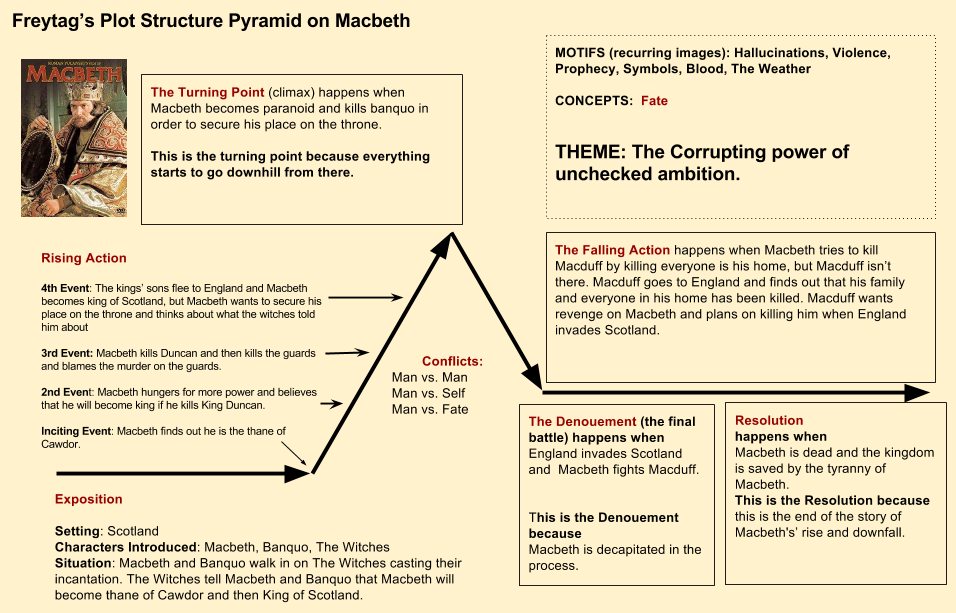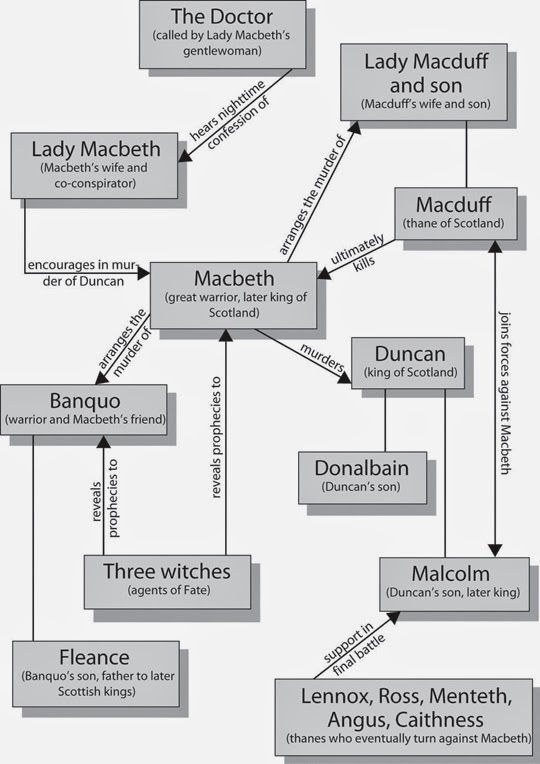Macbeth

In Macbeth “we are shown a soul tortured by an agony which admits not a moment’s repose, and rushing in frenzy towards its doom.” (Bradley, A.C., Shakespearean Tragedy) Discuss.
“Let every man be master of his time”
Shakespeare: Macbeth [3.I.4]
Macbeth, a Soul Tortured
Written in PEEL [Point, Evidence, Explanation, link] format by bunpeiris.

A Once beautiful mind is now “full of
scorpions”
In Macbeth “we are shown a soul tortured by an agony which admits not a
moment’s repose, and rushing in frenzy towards its doom.” But then, having said
that one must hasten to qualify same by saying that Macbeth was a slow starter
in evil: he was simply a loyal general of the king; he was a man of clear
conscience. In the beginning, that was. Until he was insulted by his wife that
was: ”live coward in thine own esteem.” Macbeth would have none of her
accusation: “I dare do all that may become a man.” Macbeth’s endless agony begins even before his killing,
in his own home, his own king, who held him in “double trust.” That was with
the air-borne dagger guiding him to the chamber of the king. Immediately
following the bloody regicide, the cowardly criminal believes he heard a voice
cry “sleep no more!” Macbeth would not. He could only be maddeningly awake. He
would rush in frenzy, always imagining, one more kill, one more death would
settle all the matters resulting in peace of mind and peace of state. None
would. Only his doom would settle
the matters. He has not a moment of
repose, psychologically: his soul is
tortured; his mind is bent in bloody murder, one after another, till his doom. The audience sees a decent gentleman,
loyal general turned into a traitor, whose state of mind is “full of scorpions”
all in turmoil, whose hands get bloodier with every murder. Scheming days and
sleepless nights are what he has; Maddening frenzy is his mode. All that a
killer could do is kill till he is killed. And there is always one better to
kill him. His is bound to be a soul
tortured.

The air-borne dagger
The air-borne dagger guiding Macbeth into his King’s chamber reveals his mind
in torture: he is caught in a conflict. He is a soldier who fights in the
battle for his country, for his king. He is not a killer. But then driven by
his wife’s exhortations, his earlier resolve is torn apart. To Macbeth the
air-borne dagger leading him is nothing but a “fatal vision.” Macbeth sees his
mind torn apart by the loyalty to king and his own “vaulting ambition.” He
seems to see the dagger that would fatal to his king is his fate. Following the regicide, Macbeth’s
conscience is troubled to the depths: he hears voices engulfing the atmosphere:
Macbeth shall sleep no more.” Macbeth’s mind begins to be seized in turmoil. The
blood in his hands is, to his wife, only a “filthy witness,” that simply needs
to be washed away. But to Macbeth, the king’s blood in his hands is the symbol
of his crime, sin and guilt. He sees the blood will not be washed away even in,
“all great Neptune’s ocean.” The vision of his bloody hands, the deed
committed by his bloody hands is bound to torment him for the rest of his life.

A mind in torment for the rest of his life
If Macbeth’s mind is begins to be torn with the floating dagger, following the regicide, it is shattered. Returning with Lennox to the scene of sin, the bed of crime, Macbeth falls apart:
“Had I but died an hour before this chance,
I had lived a blessèd time, for from this instant
There’s nothing serious in mortality.
All is but toys. Renown and grace is dead.
The wine of life is drawn, and the mere lees
Is left this vault to brag of.”
He laments that he has lived a happy life, but now the life is drained of all happiness. Just as when the wine is drunk, nothing remains in the cup. Herein is revealed a mind in torment for the rest of his life.
Once one kill, there is no end
It was Lady Macbeth that launched him into a career of crime and sin. But then, as the destiny would have it, she loses control over her husband. He was once king’s “valiant cousin” and a “worthy gentleman.” He was once the savior of his country. But now, he is a serial killer sunk in psychological turmoil, a regicidal sinner and criminal, tortured by his conscience, day in, day out.
Although his first murder is committed only at the behest of his queen, all the rest is at Macbeth’s own design. Macbeth is often reminded, in his horrible dreams, the second prophesy of the witches. The prediction that Banquo’s heirs would hold throne torments him. He is also stricken by the fact that Banquo would one day suspect him of regicide, and that day would reveal his suspicions. Macbeth makes up his mind, now a scheming mind, to have Banquo killed too. Just one more kill and he would have some peace of his mind. At least that is what he imagines, and imagines falsely in his tortured mind.

Let every man be master of his time
Shakespeare makes
Macbeth say, “Let every man be master of his time/Till seven at night,” within
the context of banquet. Macbeth means that every guest may do as they please
until seven o’clock tonight. Should one seeks to delve into these couple of
lines, he may lift the first line out of the context and consider. Then it
becomes obvious what Macbeth says is bound to become quite ironical. Macbeth,
if anything at all, definitely not the master of his time. His time, in a very
short time, becomes one that belongs to
a soul tortured by an agony, day after day.
The murder of Banquo on their way to banquet, does bring him no peace of mind. But his son Fleance escapes. He had his comrade in arms killed: he had the general, who fought by his side, defeating the Norwegians and Thane of Cawder, the traitor, is ambushed and killed by the assassins. To the guests at royal banquet Banquo is absent. But to Macbeth, Banquo’s ghost is not. The startled king almost betrays his guilt. His guilt was such, it was Lady Macduff, acting with tact, that saved the situation. Macbeth sees a ghost that nobody else in the banquet could see. His conscience is in turmoil; his soul is in torment.

Macbeth becomes bloody and bold
The abnormal behavior of Macbeth at Banquet giving rise to shades of doubts in
the minds of nobles, Macbeth makes a visit to the witches “upon the heath.” Therein
he learns that he would not be defeated unless Birham forest move and “none of
the woman born/shall harm Macbeth.” It is upon the advice of the witches that
that Macbeth resolves to become bloody and bold. Macbeth himself realizes that
once begins with murder, there is no end. He is in a river of blood. Even if he
does not “wade” anymore, it would be almost impossible to become good or get
back to his former self, prior to the regicide. He realizes he has to act upon
“strange things [he] has in [his] head, even before such things are thought of
or “scanned” Herein is a soul tortured
by an agony which admits not a moment’s repose.
The murder of the innocent
To the guests at royal banquet is Banquo is absent at the banquet. So is Macduff. To Macbeth, Macduff’s absence is a defiance. It was Macbeth’s line of thought, elimination of Banquo would be the end of doubts of all doubters. But then, Macbeth is mistaken. Macduff do have doubts on him: he has escaped to England leaving his family in Scotland. Macduff in England closes ranks with Malcolm, son of murdered King Duncun. Devoid of respite, Macbeth sinks into further degradation: he resolves to bring Macduff into submission. His savage frenzy makes him to order the killing of Macduff’s wife and children. The murder of the innocent reveals a mind rushing in frenzy to bloody murders. Macbeth’s is a soul tortured by an agony which admits not a moment’s repose, and rushing in frenzy.
Our country sinks beneath the yoke. It weeps, it bleeds. Following the murder of the family of MacDuff, Macbeth realizes, Macduff could rise again: “We have scotche’d the snake, not kill’d it: She’ll close and be herself.” Unable to put an end of Macduff in exile in England, Macbeth’s rage falls upon his subjects in Scotland. And his country suffers from his brutalities, making Ross say, “Sighs and groans and shrieks … rend the air.” Malcolm too laments that he thinks is country, “sinks beneath the yoke./It weeps, it bleeds, and each new day a gash/Is added to her wounds.” Macbeth’s Scottish subjects are no longer able to suffer his tyranny. The rebel Scots led by Scottish nobles Menteith, Caithness, Angus and Lennox join an English army lead by Malcolm, Siward and Macduff to raise an army of great numbers. The imagery of injury in the language is significant. More blood is destined flow, soon in the battlefield.

Macbeth is ready for battle, indeed he rather anxious to meet his enemies despite of the defection of his Scottish nobles. The prophesis of the witches is such he would not be defeated unless Birham forest; he would not be killed by any born to woman. Nevertheless life has seized to be any value to him in the backdrop of his suffering and his wife’s suffering. When learns that Lady Macbeth is dead, his response is entirely devoid of grief. He simply mutters that future is of no significance: life is but a, “tale/ Told by an idiot, full of sound and fury, /Signifying nothing.

In the beginning, Macbeth is upheld by the concept that what is rightfully yours, will fall into your hands: “If chance will have me king, why chance may crown me,/without my stir.” But then Macbeth falling into his wife’s unwarranted, uncalled for exhortation, strives to take destiny into his hands, try to play god, whereas he ought to have carried on simply discharging his duties for his country and for his king. While carrying out his duty, if he is destined to become king, he would become the king. Scheming maneuvers and manipulations, horrifying misdeeds and violent acts are not called for. All one needs to do his carrying out his duty. Macbeth, who was once, “too full of milk of human kindness,” driven by “vaulting ambition,” has become “a devil more damned” with soul tormented in endless agony rushing in a “fitful fever” towards his doom.
Works Cited
Bhatia, Praveen. William Shakespeare’s Macbeth. new Delhi 110 002: UBS Publishers Distributions Pvt. Ltd., 2012.
